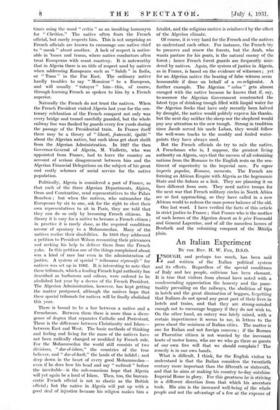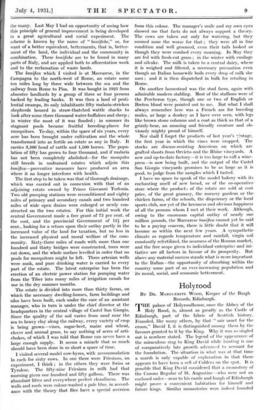An Italian Experiment
BY THE REV. H. W. Fox, D.S.O.
FNOUGH, and perhaps too much, has been said and written of the Italian political system and its effects. Regardless of the special conditions of Italy and her people, criticism has been clamant. It is true that visitors from abroad have noted with a condescending appreciation the honesty and the punc- tuality prevailing on the railways, the abolition of tips in hotels and the great diminution of beggars, forgetting that Italians do not spend any great part of their, lives in hotels and trains, and that they are strong-minded enough not to encourage beggary if they do not wish to. On the other hand, an outcry was lately raised, with a certain impertinence it seems to me, in letters to the press about the noisiness of Italian cities. The matter is one for Italian and not foreign concern ; if the Roman or Florentine citizen is not worried by the incessant hoots of motor horns, who are we who go there as guests of our own free will that we should complain ? The remedy is in our own hands.
What is difficult, I think, for the English visitor to understand is that the Italian considers the twentieth century more important than the fifteenth or sixteenth, and that he aims at making his .country to-day outshine Imperial Rome in glory. For this greatness he is striving in a different direction from that which his ancestors took. His aim is the increased well-being of the whole people and not the advantage of a few at the expense of the many. Last May I had an opportunity of seeing how this principle of general improvement is being developed in a great agricultural and social experiment. The scheme is known by the name of " bonifiche," or, for want of a better equivalent, betterments, that is, better- ment of the land, the individual and the community in combination. These bonifiche are to be found in 'many parts of Italy, and are applied both to afforestation work and to the reclamation of waste lands.
The bonifica which. I visited is at Maccarese, in the Campagna to the north-west of Rome, an estate some ten miles long by three wide between the sea and the railway from Rome to Pisa. It was bought in 1925 from absentee landlords by a group of three or four persons•backed by leading banks. It was then a land of pesti- lential swamps, its only inhabitants fifty malaria-stricken shepherds housed in straw-thatched wattle shacks to look after some three thousand water-buffaloes and sheep ; in winter the most of it was flooded ; in summer its stagnant pools became fruitful breeding-places for mosquitoes. To-day, within the space Of six years, every acre has been brought under cultivation and the whole transformed into as fertile an estate as any in Italy. It carries 3,50(1 head of cattle and 1,500 horses. The popu- lation of fifty- has grown. to four thousand, and if malaria has not been completely abolished—for the mosquito still breeds in undrained estates which adjoin this bonifica—preventive measures have produced an area where it no longer interferes with health.
The first step to be taken was that Of thorough drainage, which was carried out in connexion with that of an adjoining estate owned by Prince Giovanni Torlonia. Two old pumping stations were reconditioned and eighty miles of primary and secondary canals and two hundred miles of wide open drains were enlarged or newly con- structed on the two estates: For this initial work the central Government made a free grant of 75 per cent. of the cost, and the provincial Government of 12/ per cent., looking for a return upon their outlay partly in the increased value of the land for taxation, but no less in the increased physical and moral welfare of the com- munity. Sixty-three miles of roads with more than one hundred and thirty bridges were constructed, trees were cut down, and the whole surface levelled in order that no pools for mosquitoes might be left. Three artesian wells were sunk, and pure drinking water is carried to every part of the estate. The latest enterprise has been the erection of an electric power station for pumping water from the Tiber into many miles of irrigation canals for use in the dry summer months.
The estate is divided into more than thirty farms, on which the necessary dwelling-houses, farm buildings and silos have been built, each under the care of an assistant manager, who in turn is under the chief director at the headquarters in the central village of Castel San Giorgio. Since the quality of the soil varies from sand near the sea to heavy clay along the railway, every variety of crop is being grown—vines, sugar-beet, maize and wheat, clover and annual grass, to say nothing of acres of arti- chokes, of which I was told that Rome can never have a large enough supply. It seems a miracle that so much should have been done in so short a space of time.
I visited several model cow-byres, with accommodation in each for sixty cows. In one there were Friesians, an experiment, I think ; in the others they were Swiss or Tyrolese. The fifty-nine Friesians in milk had that Morning given one hundred and fifty gallons. There was abundant litter and everywhere perfect cleanliness. The walls and roofs were colour-washed a pale blue, in accord- ance with the theory that flies have a special aversion from this colour. The manager's smile and my own eyes showed me that facts do not always support a theory.
The cows are taken out only for watering, but they seemed none the worse for that ; they were all in fine condition and well groomed, even their tails looked as though they were combed every morning. In May they are fed with fresh-cut grass ; in the winter with ensilage and oileake. The milk is taken to a central dairy, where it is weighed and filtered, a necessary precaution even though an Italian housewife boils every drop of milk she uses ; and it is then dispatched in bulk for retailing in Rome.
On another homestead was the stud farm, again with admirable modern stabling. Most of the stallions were of the Percheron type, though one or two of English or Breton blciod were pointed out to me. But what I shall always remember here was a French ass for breeding males, as large a donkey as I have ever seen, with legs like brown stone columns and a coat as thick as that of a grizzly-bear, an amazing and friendly creature and ob- viously mighty proud of himself.
Nor shall I forget the products of last year's -Hntage, the first year in which the vines were cropped. The stocks are disease-resisting American on which are grafted shoots from Orvieto and the Rhine vineyards. A new and up-to-date factory—it is too large to call a wine- press—is now being built, and the output of the Castel San Giorgio vineyards 'promises to be as large as it is good, to judge from the samples which I tasted: I have no space to speak of the model bakery with its enchanting smell of new bread, or of the co-operative store where the product; of the estate are sold at cost price, of the great granary, the nursery gardens or the chicken farms, of the schools, the dispensary or the local sports club, nor yet of the keenness and obvious happiness of all the persons whom I met at their work. Although, owing to the enormous capital outlay of nearly one million pounds, the Maccarese bonifica cannot yet be said to be a paying concern, there is little doubt that it will become so within the next few years. A sympathetic climate as regards temperature and rainfall, virgin soil constantly refertilized, the nearness of the Roman market, and the free scope given to individual enterprise and ini- tiative are all factors in favour of its prosperity. But above any material success stands what is more important to the Italian—the opportunity of absorbing within the country some part of an ever-increasing population and its moral, social, and economic betterment.











































 Previous page
Previous page